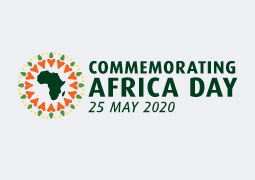
The Covid-19 pandemic has disrupted all aspects of life, everywhere in the world and the commemoration of the 57th anniversary of the formation of the Organisation of the African Union (OAU), which was established on 25 May 1963, is no exception. Eventually, the OAU became the African Union (AU) in Durban, South Africa, in 2002 and every year the 25 May is celebrated across the continent as Africa Day.
In marking the 57th anniversary, the South African Parliament held a virtual Africa Day lecture, delivered by Professor Adekeye Adebajo, an accomplished African scholar currently serving as the Director of the Institute for Pan-African Thought and Conversation at the University of Johannesburg. The theme of the lecture was: “Silencing the Guns: Creating conditions for Africa’s development to achieve the goal of a conflict-free Africa”.
The programme for the day began with the singing of the AU and South African anthems, followed by opening remarks from the co-programme director and Deputy Chairperson of the National Council of Provinces (NCOP), Ms Sylvia Lucas. In her remarks, she said said the decisions of a conference held in Berlin, Germany, in 1884 in which the colonial powers of Europe divided Africa among themselves, are the source of all the problems that Africa experiences today.
Ms Lucas called upon on South Africans to use this anniversary as an opportunity to recommit to unity on the continent and to push back the tide of inequality and poverty that are terrible enemies of the people. She said Africans must follow in the footsteps of their forebears, such as Kwame Nkrumah and others. She added: “We need to be more united now than ever before as Africans, as we are not only sharing history, but destiny as well.”
Also addressing Members of Parliament before the delivery of the lecture, the Speaker of the National Assembly, Ms Thandi Modise, said if anybody had told her a few months ago that Parliament would be holding virtual sittings, that programming, planning and management would be done remotely, she would have said “stop daydreaming”.
“Here we are, rising to the challenges prompted by a microscopic, seemingly invisible energy. The disruption of Covid-19 is far from being invisible: it has multiplied the socio-economic hardships of our country; it has magnified the disparities in it. It is an unrelenting and unforgiving enemy; but we came out to face it – this threat to life and livelihoods. This is a war fought without guns. It is fought with decisive leadership, strengthened collective resolve, human ingenuity and resilience.”
She described the pandemic as a new enemy with different tactics. She said the terrain is all too familiar in Africa; it is poverty, hunger, underdevelopment, inequality, disenfranchisement, oppression, corruption and violence especially against the women and children.
“We observe Africa Day today,” Ms Modise continued, “and remind ourselves of the value and strength in our joint and collective fight against our shared and common threat to life and livelihoods. We remind ourselves of our resolve to the development and prosperity of our nations, our continent and her people.”
Ms Modise said the founding documents of the AU called for the establishment of a parliament for this purpose. This parliament, the Pan African Parliament (PAP), was inaugurated in March 2004 and was the culmination of concerted efforts from many African parliaments, spearheaded by “our own Parliament”.
She also mentioned Agenda 2063, drawn up in 2013, which provides a blueprint for what Africa needs to achieve over the next 50 years. “It espouses seven aspirational pillars located firmly in the ideals of Pan Africanism, a shared African identity, regional integration and unity. It is people-centred and is supposed to be people-driven.”
The Southern African Development Community (SADC) Parliamentary Forum is a well-established consultative assembly with deliberative powers and there is general agreement that it should be given legislative power that would facilitate better integration and development in the region. “For us this cannot be delayed any further,” Ms Modise noted.
“We observe Africa Day today in a reflective mood,” she continued, “uncertain of the lives we will continue to lose to this coronavirus, uncertain of the socio-economic impact on the morale of our people. Yet we remain positive in this rapidly changing and volatile world. We remain in our resolve and resilience to face and overcome what may be new and yet unknown threats in the future. Our unfailing belief, hope and certitude is that this too shall pass and we shall emerge from this stronger because we have faced this with our collective resolve.”
by Mava Lukani

